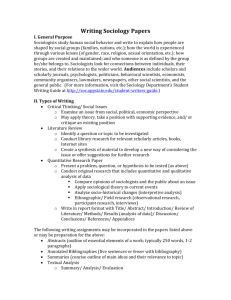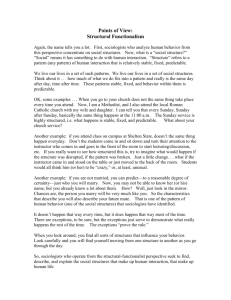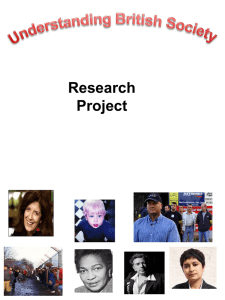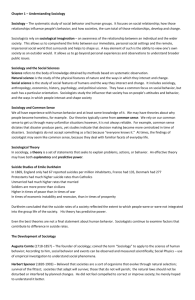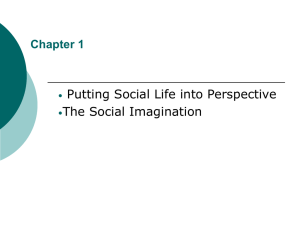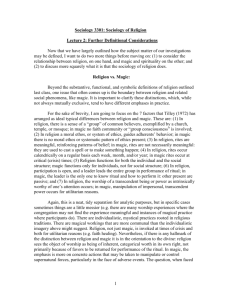The relationship between sociology and social policy
advertisement
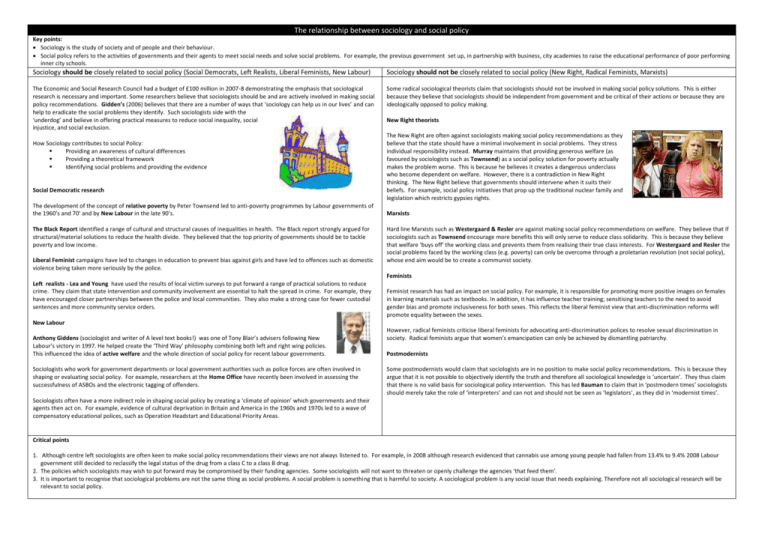
The relationship between sociology and social policy Key points: Sociology is the study of society and of people and their behaviour. Social policy refers to the activities of governments and their agents to meet social needs and solve social problems. For example, the previous government set up, in partnership with business, city academies to raise the educational performance of poor performing inner city schools. Sociology should be closely related to social policy (Social Democrats, Left Realists, Liberal Feminists, New Labour) Sociology should not be closely related to social policy (New Right, Radical Feminists, Marxists) The Economic and Social Research Council had a budget of £100 million in 2007-8 demonstrating the emphasis that sociological research is necessary and important. Some researchers believe that sociologists should be and are actively involved in making social policy recommendations. Gidden’s (2006) believes that there are a number of ways that ‘sociology can help us in our lives’ and can help to eradicate the social problems they identify. Such sociologists side with the ‘underdog’ and believe in offering practical measures to reduce social inequality, social injustice, and social exclusion. Some radical sociological theorists claim that sociologists should not be involved in making social policy solutions. This is either because they believe that sociologists should be independent from government and be critical of their actions or because they are ideologically opposed to policy making. How Sociology contributes to social Policy: Providing an awareness of cultural differences Providing a theoretical framework Identifying social problems and providing the evidence Social Democratic research The development of the concept of relative poverty by Peter Townsend led to anti-poverty programmes by Labour governments of the 1960’s and 70’ and by New Labour in the late 90’s. The Black Report identified a range of cultural and structural causes of inequalities in health. The Black report strongly argued for structural/material solutions to reduce the health divide. They believed that the top priority of governments should be to tackle poverty and low income. Liberal Feminist campaigns have led to changes in education to prevent bias against girls and have led to offences such as domestic violence being taken more seriously by the police. New Right theorists The New Right are often against sociologists making social policy recommendations as they believe that the state should have a minimal involvement in social problems. They stress individual responsibility instead. Murray maintains that providing generous welfare (as favoured by sociologists such as Townsend) as a social policy solution for poverty actually makes the problem worse. This is because he believes it creates a dangerous underclass who become dependent on welfare. However, there is a contradiction in New Right thinking. The New Right believe that governments should intervene when it suits their beliefs. For example, social policy initiatives that prop up the traditional nuclear family and legislation which restricts gypsies rights. Marxists Hard line Marxists such as Westergaard & Resler are against making social policy recommendations on welfare. They believe that if sociologists such as Townsend encourage more benefits this will only serve to reduce class solidarity. This is because they believe that welfare ‘buys off’ the working class and prevents them from realising their true class interests. For Westergaard and Resler the social problems faced by the working class (e.g. poverty) can only be overcome through a proletarian revolution (not social policy), whose end aim would be to create a communist society. Feminists Left realists - Lea and Young have used the results of local victim surveys to put forward a range of practical solutions to reduce crime. They claim that state intervention and community involvement are essential to halt the spread in crime. For example, they have encouraged closer partnerships between the police and local communities. They also make a strong case for fewer custodial sentences and more community service orders. Feminist research has had an impact on social policy. For example, it is responsible for promoting more positive images on females in learning materials such as textbooks. In addition, it has influence teacher training; sensitising teachers to the need to avoid gender bias and promote inclusiveness for both sexes. This reflects the liberal feminist view that anti-discrimination reforms will promote equality between the sexes. New Labour Anthony Giddens (sociologist and writer of A level text books!) was one of Tony Blair’s advisers following New Labour’s victory in 1997. He helped create the ‘Third Way’ philosophy combining both left and right wing policies. This influenced the idea of active welfare and the whole direction of social policy for recent labour governments. Sociologists who work for government departments or local government authorities such as police forces are often involved in shaping or evaluating social policy. For example, researchers at the Home Office have recently been involved in assessing the successfulness of ASBOs and the electronic tagging of offenders. However, radical feminists criticise liberal feminists for advocating anti-discrimination polices to resolve sexual discrimination in society. Radical feminists argue that women’s emancipation can only be achieved by dismantling patriarchy. Postmodernists Some postmodernists would claim that sociologists are in no position to make social policy recommendations. This is because they argue that it is not possible to objectively identify the truth and therefore all sociological knowledge is ‘uncertain’. They thus claim that there is no valid basis for sociological policy intervention. This has led Bauman to claim that in ‘postmodern times’ sociologists should merely take the role of ‘interpreters’ and can not and should not be seen as ‘legislators’, as they did in ‘modernist times’. Sociologists often have a more indirect role in shaping social policy by creating a ‘climate of opinion’ which governments and their agents then act on. For example, evidence of cultural deprivation in Britain and America in the 1960s and 1970s led to a wave of compensatory educational polices, such as Operation Headstart and Educational Priority Areas. Critical points 1. Although centre left sociologists are often keen to make social policy recommendations their views are not always listened to. For example, in 2008 although research evidenced that cannabis use among young people had fallen from 13.4% to 9.4% 2008 Labour government still decided to reclassify the legal status of the drug from a class C to a class B drug. 2. The policies which sociologists may wish to put forward may be compromised by their funding agencies. Some sociologists will not want to threaten or openly challenge the agencies ‘that feed them’. 3. It is important to recognise that sociological problems are not the same thing as social problems. A social problem is something that is harmful to society. A sociological problem is any social issue that needs explaining. Therefore not all sociological research will be relevant to social policy.


